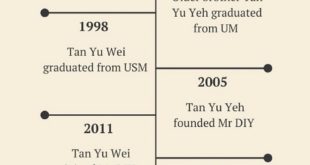[This is a sponsored article with MDEC.]
The COVID-19 pandemic has changed the norm, and for many, the new norm has not been easy. Besides having a large portion of the population stuck working and studying from home, many businesses saw their normal income streams reduced or even cut off.
It was in challenging times like these where a group of local technology companies decided to rise to the occasion and look beyond their own situations or issues.
These companies have a shared interest in helping Malaysians tide through the pandemic by helping those in need, ensuring that Malaysian society at large will be able to contribute to the economy, including the digital economy. This is in line with Malaysia Digital Economy Corporation’s (MDEC) vision to create a technologically integrated society in line with Malaysia 5.0.
As the agency tasked to lead Malaysia’s digital economy, MDEC’s GAIN programme has nurtured over 150 successful tech companies.
The More You Know: GAIN stands for ‘Gateway, Amplify, Invest, Nurture’. It is an ongoing initiative that assists tech companies by providing market access, high-visibility impact activities, access to funding facilitations and growth through a mentorship system.
Thanks to the head-start and assistance these companies received through the GAIN program, they’ve decided to pay-it-forward through their fierce drive for community building. They are not just capable of running a highly successful global business, but they’ve also made it a priority to help the nation and to give back to the ones in need.
Here are some stories of how MDEC’s GAIN companies have helped out others throughout the pandemic.
1. Providing Workable PCs And Tablets To Students Who Need Them
With schools physically closed, classes have transitioned online. But for those who are in a rough financial situation, getting a capable PC for their kids to use might be close to impossible.
Rentwise, a provider of Green IT Solutions, tackled this issue by equipping underprivileged schools with functioning PCs for their students. They collect retired computers, which were then restored and data-wiped, breathing new life into the devices before passing them to the students.
To date, they’ve prepared over 250+ refurbished PCs for schools in the nation. They’ve worked alongside MDEC to donate several laptops to students in Tenom Innovation Centre, Sabah recently too.
Like Rentwise, SNS Network, a local technology solutions provider also worked on addressing the needs of schoolchildren during the pandemic.

They’ve donated 15 units of JOI tablets (SNS’s own-brand of devices) and a combination of 70 headsets, speakers, and printers to SMK Permatang Rawa. This allowed the school to supply their students with tablets for remote learning.
Besides schools, the SNS team gave 9 JOI Notebooks to the team in Penang Hospice Society to keep their doctors and physicians connected.
2. Ensuring B40 Families Still Have Food On The Table
Those who lost their jobs during the pandemic might struggle with finding a new source of income. This could spell disaster for B40 families as most of them live from hand to mouth.
Innov8tif, an AI solutions provider to help businesses reach more sales and improve traditional processes, organised a Sumbangan Kasih programme to assist with the welfare needs of the B40 groups in Subang Jaya. Working with MBSJ, they handed out food and grocery vouchers to 200 families in need in May 2020.
“We understand that when it comes to giving back to the community, any action, big or small can make a real difference,” said George Lee, the CEO of Innov8tif.

3. Giving Financial Aid To Impacted Communities
Some companies have opted to give monetary donations to NGOs and people in need that lack financial resources for essentials.
Vitrox, a local manufacturer for electronic equipment provided RM1,088,790 of funds to several NGOs, schools and hospitals.
HR platform, WorkSmartly ran a ‘Gaji Sehari Challenge’ whereby employees informed their management how many days of their salary they wished to donate, which the management then matched. At the end of the challenge, they collected RM5,750 and they’ve donated the funds to Mercy Malaysia, Kitafund and Zoo Negara.
4. Launching Initiatives On A Larger Scale
Some of the larger companies opted to launch several initiatives, tackling multiple fronts.
One of the GAIN companies doing so is Forest Interactive, a telecommunications platform provider operating in 39 countries, who utilised their massive reach to its full potential.
Through #ForestCares, they contributed necessities to over 147 households with more than 1,100 people in the Temuan Orang Asli community in Damansara Perdana. They’ve also launched their #Qurban initiative in their Indonesia branch. They prepared Qurbani (animal livestock sacrifice during Eid) to over 430 people in Indonesia.
But they’re not alone in these ventures.
Collaborating with Street Feeders of KL (SFOKL), they provided food and necessities to street friends (the term for the homeless used by SFOKL) in key KL areas through their #CANFeedTheHungry initiative. Initially, they set out to raise RM2,000 but exceeded that goal, securing over RM2,700 for SFOKL’s use.
redONE, a mobile virtual network in Malaysia have also opted to launch several initiatives as well. They’ve allotted free 10GB high-speed internet to all of their customers, helping them to stay connected during the pandemic and they gave out 1GB of data daily too, which is helpful for the students relying on mobile data for their studies.

To assist those who are looking for job opportunities, they’ve launched the redONE Preneur Sales Advisor (RPSA) programme to connect over 10,000 Malaysians with job opportunities. The programme helped participants become sales advisors, equipped with professional training and coaching.
The team behind redONE worked jointly with the Perak State Government as well. They launched the Telcopreneur Perak Programme to nurture 1,000 youths, unemployed, and small business operators to be telco entrepreneurs.
5. Protecting The Frontliners
Meanwhile, MDT Innovations, a tech company with a focus on IoT products, opted to equip the frontliners from the Immigration, Security and Passport Division with over 400 boxes of face masks, ensuring that our immigration officers are safe while working.
They’ve also partnered up with more than 13 NGOs, distributing over 400,000 face masks and 4,000 bottles of sanitiser to more than 16,000 beneficiaries locally.
-//-
These companies have shown that they have aspirations toward achieving shared prosperity and community building is deeply rooted in their core value. This is exactly the type of company that MDEC hopes to continue nurturing.
“The contributions and actions of these GAIN companies are a reflection of MDEC’s vision of Malaysia 5.0—a human-first society in a tech-age. While many of these companies have solutions and innovations that work towards the Fourth Industrial Revolution (4IR), their actions show that they put society at the centre of what they do,” says Gopi Ganesalingam, Vice President of MDEC’s Digitally Powered Business Division.
“We hope to see more tech companies in Malaysia contribute to society whenever they can as these GAIN companies have, and contribute to the efforts of our nation reaching vision Malaysia 5.0.” Gopi added.
MDEC, backed with the support from the Ministry of Communications and Multimedia (KKMM) will continue to lead the digital economy forward, ensuring shared prosperity for many Malaysians along with realising Malaysia 5.0.
This is achieved through their focus on three strategic pillars of empowering Digitally Skilled Malaysians, accelerating Digitally-Powered Businesses and attracting Digital Investments.
- For more information on MDEC’s GAIN programme, click here.
- Find out more about what we’ve written about MDEC in the past here.
Featured Image Credit: Forest Interactive / MDT Innovations




